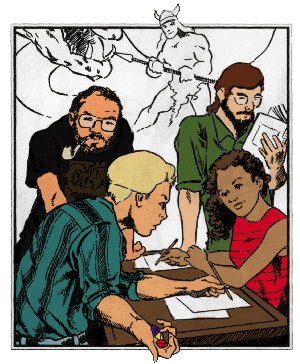


A friendly game of Dungeons & Dragons, played at a table with dice.
D&D stands for Dungeons & Dragons. It's the world's first RPG (which stands for Role Playing Game.) D&D is like a board game—you get together with your friends and play it on a table with dice and tokens. The best part of D&D is that it's open ended and imaginitive. If you can think of a creative way to solve to a problem, you can make it happen in the game. You don't have to be restricted by the rules.
In D&D, each player takes on the role of a character, which has scores associated with it such as strength, dexterity, and intelligence. The player uses this character to explore dungeons, fight monsters, and solve mysteries. One of the players gets to be the Dungeon Master, a special job which is like being a moderator. When a player wants his character to do something, like attack a monster, he tells the Dungeon Master so. They both roll some dice, and if the player rolls higher, he succeeds.
D&D was first published in 1974, and is still published today. Many other RPGs have been created since. Some of these are "pencil and paper" games like the original D&D, played in person with paper, books, dice, and tokens. Others are computer games, such as World of Warcraft or Final Fantasy. Regardless of how they are played, all RPGs are based in part on the original Dungeons & Dragons.
You're probably already familiar with 6-sided dice with dots on them. Lots of board games and dice games use them. D&D, however, uses special polyhedral dice, which allow for different ranges of numbers to be generated.
The dice used in Dungeons & Dragons are as follows:
The D10 and D100 dice are used together to generate a number from 0-99. When used as a pair, these are called percentile dice.
The variety of different kinds of dice allows for flexibility in the game. For example, you roll a D20 when deciding whether you succeed in hitting a monster with your sword, but you roll a D8 when deciding how many points of damage you dealt.